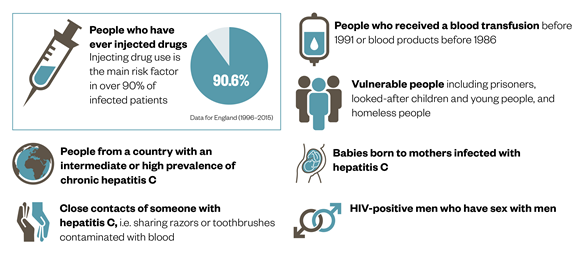Hepatitis C Treatment in Switzerland
Search and Compare the Best Clinics and Doctors at the Lowest Prices for Hepatitis C Treatment in Switzerland

Find the best clinics for Hepatitis C Treatment in Switzerland
No clinics available
Turkey offers the best prices Worldwide
Price: $ 22,731

- Home
- Switzerland
WHY US?
At Medijump, we're making medical easy. You can search, compare, discuss, and book your medical all in one place. We open the door to the best medical providers worldwide, saving you time and energy along the way, and it's all for FREE, no hidden fees, and no price markups guaranteed. So what are you waiting for?

Free

Best Price

Widest Selection

Risk-Free
What you need to know about Hepatitis C Treatment in Switzerland

Hepatitis C is a viral infection that can cause liver inflammation and lead to serious liver damage. If you have hepatitis C, your doctor will examine your specific condition and make a treatment plan based on the type of the hepatitis C (genotypes), your general condition, and how much liver scarring (cirrhosis) you have.
What does a Hepatitis C Treatment Procedure Involve?
The main treatment options for hepatitis C are antiviral medication and liver transplantation. Antiviral medication is used to clear the virus from your body in at least 8 to 12 weeks. If you have developed a more serious complication, then liver transplantation can be an option. During liver transplantation, you are given a general anesthetic, and then your doctor removes the damaged liver and replaces it with a healthy liver, either from a deceased donor or a living donor.
How Long Should I Stay in Switzerland for a Hepatitis C Treatment Procedure?
If your doctor gives you antiviral medication, you may need to stay in Switzerland for a few weeks as your doctor needs to monitor how your body is responding to the medication. If you undergo surgery, you are required to spend 5 to 10 days in the hospital and stay in the country for 10 to 14 more days after you are discharged from the hospital.
What's the Recovery Time for Hepatitis C Treatment Procedures in Switzerland?
The recovery time depends on which treatment you underwent. With antiviral medication, you should be able to get back to most of your normal routine within a couple of days or as soon as you do not experience any symptoms or side effects from the medication. With a liver transplant, the full recovery period can take around six months, but you should be able to return to work within 12 weeks.
What sort of Aftercare is Required for Hepatitis C Treatment Procedures in Switzerland?
Making healthy lifestyle changes is very important after your treatment, such as following a healthy and balanced diet plan and regular exercise. Treatment with antiviral medication requires regular follow-up checkups to monitor your condition and progress. With liver transplantation, you also need regular checkup and you may need to take medication for a longer period of time.
What's the Success Rate of Hepatitis C Treatment Procedures in Switzerland?
Antiviral medicine is a safe and effective treatment for hepatitis C, with around 90% of patients with the condition are cured. Liver transplant is generally safe and approximately 70% of patients who undergo the procedure can live for ten years or longer. Both have some side effects and risks, such as depression, anxiety, skin irritation, insomnia, anorexia, tiredness, hair loss, aggressive behavior, bile duct complications, blood clots, bleeding, failure or rejection of donated liver, infection, mental confusion, and seizures
Are there Alternatives to Hepatitis C Treatment Procedures in Switzerland?
You will need antiviral medication to treat hepatitis C, but if the infection is diagnosed in the early stages, you may not need treatment immediately. However, you still need to make lifestyle adjustments. Your doctor will have several blood tests to see if your body fights off the virus, if the infection does not continue, you usually do not need treatment.
What Should You Expect Before and After the Procedure
When you have hepatitis C, the virus can damage your liver and you may experience symptoms, such as fatigue, bruising easily, bleeding easily, jaundice, weight loss, dark-colored urine, and more. After treatment, you may be cured and will not experience any of these symptoms anymore.
Whilst the information presented here has been accurately sourced and verified by a medical professional for its accuracy, it is still advised to consult with your doctor before pursuing a medical treatment at one of the listed medical providers
No Time?
Tell us what you're looking for and we'll reachout to the top clinics all at once
Enquire Now

Popular Procedures in Switzerland
Prices Start From $50

Prices Start From $35,013

Prices Start From $39

Recommended Medical Centers in Switzerland for procedures similar to Hepatitis C Treatment

- Interpreter services
- Translation service
- Religious facilities
- Medical records transfer
- Medical travel insurance
- Health insurance coordination
- TV in the room
- Safe in the room
- Phone in the room
- Private rooms for patients available

- Interpreter services
- Translation service
- Religious facilities
- Medical records transfer
- Medical travel insurance
- Health insurance coordination
- TV in the room
- Safe in the room
- Phone in the room
- Private rooms for patients available

- Interpreter services
- Translation service
- Religious facilities
- Medical records transfer
- Medical travel insurance
- Health insurance coordination
- TV in the room
- Safe in the room
- Phone in the room
- Private rooms for patients available

- Interpreter services
- Translation service
- Religious facilities
- Medical records transfer
- Medical travel insurance
- Health insurance coordination
- TV in the room
- Safe in the room
- Phone in the room
- Private rooms for patients available

- Interpreter services
- Translation service
- Religious facilities
- Medical records transfer
- Medical travel insurance
- Health insurance coordination
- TV in the room
- Safe in the room
- Phone in the room
- Private rooms for patients available

- Interpreter services
- Translation service
- Religious facilities
- Medical records transfer
- Medical travel insurance
- Health insurance coordination
- TV in the room
- Safe in the room
- Phone in the room
- Private rooms for patients available

- Interpreter services
- Translation service
- Religious facilities
- Medical records transfer
- Medical travel insurance
- Health insurance coordination
- TV in the room
- Safe in the room
- Phone in the room
- Private rooms for patients available

- Interpreter services
- Translation service
- Religious facilities
- Medical records transfer
- Medical travel insurance
- Health insurance coordination
- TV in the room
- Safe in the room
- Phone in the room
- Private rooms for patients available

- Interpreter services
- Translation service
- Religious facilities
- Medical records transfer
- Medical travel insurance
- Health insurance coordination
- TV in the room
- Safe in the room
- Phone in the room
- Private rooms for patients available

- Interpreter services
- Translation service
- Religious facilities
- Medical records transfer
- Medical travel insurance
- Health insurance coordination
- TV in the room
- Safe in the room
- Phone in the room
- Private rooms for patients available
Hepatitis C Treatment in and around Switzerland
About Switzerland
Switzerland is a landlocked country located in Europe and is famous for its chocolate and clocks; this country offers its visitors beautiful landscapes, medieval towns, modern art, avant-garde culture, and Alpine tradition. From the Swiss Alps and the Jura Mountains to Renaissance-era allegorical statues and medieval architecture, Switzerland provides an unforgettable experience for everyone. Today, the country is popular with medical tourists who travel here for top quality elective surgery and dentistry. The healthcare system is world-renowned and beyond impressive, with highly qualified doctors and staff who work in ultra-modern hospitals and clinics. According to the WHO, Switzerland’s public health services system is one of the most effective in the world. A full range of advanced medicine and technology are available here, from heart surgery, orthopedics, neurosurgery, to oncology.
Popular Cities and Regions in Switzerland
Most medical tourists travel to Bern, the de facto capital of Switzerland. Here, tourists can walk around the historic town center that is brimming with churches, cobblestone streets, medieval clock towers, and well-preserved sandstone homes. The main attractions in this city are Zentrum Paul Klee and Kunstmuseum. Besides Bern, Zürich is a famous destination for medical tourists. Set on the beautiful Zurich Lake, this city offers many amazing medical centers and tourist attractions. It’s a culturally vibrant city that is recognized as one of the most liveable cities in the world. Tourists are welcome to visit Fraumüster, explore Schweizerisches Landesmuseum, and admire art at Kunsthaus. Along with Bern and Zürich, Geneva is also popular. It has the world’s largest fountain, a historic city center, and spectacular views of Lake Geneva.
Transport in Switzerland
Zurich Airport is the main gateway to Switzerland. It serves regular scheduled and charter flights to and from numerous cities in Europe, North America, and Asia. Public transport in the country is comprehensive. Trains are comfortable and scenic, and buses take over where the rails run out. Taxis and Uber are available to travel inside cities.
Visas in Switzerland
As a part of the Schengen Agreement, Switzerland allows citizens of 62 countries, including Australia and the US, to stay in the country without a visa for up to 90 days. Nationals of most other countries are required to have a Schengen visa to enter the country.
Weather in Switzerland
Winter (November – March) is cold and snowy, with an average temperature of 5 to 10°C in Zurich. It’s a popular time for tourists who want to ski. Spring (April – June) has warmer weather, although some areas still experience snowfall. Summer (July – August) brings perfect and warm weather, with an average temperature of 27°C. Autumn (September – October) is still warm but the days are becoming shorter.
Additional Info
- Local Currency: The currency is the Swiss Franc (CHF). 1 CHF is equivalent to 1.04 USD.
- Money & Payments: ATMs can be found easily and major credit cards (Visa and MasterCard) are widely accepted. Tipping is not necessary.
- Local Language: Switzerland has four official languages: German, French, Italian, and Romansh. Most of the population speaks excellent English, especially those in major cities.
- Local Culture and Religion: The predominant religion is Christianity, which has been present in the country since the Roman Era. The country guarantees full freedom of religion, and Islam, Hinduism, Buddhism, Judaism, as well as other religions are practiced by a small portion of the population.
- Public Holidays: Switzerland has several public holidays, including New Year’s Day, Berchtold's Day, Corpus Christi, Immaculate Conception Day, and Christmas Day.
Popular Searches
- Plastic Surgery in Thailand
- Dental Implants in Thailand
- Hair Transplant in Thailand
- Breast Augmentation Thailand
- Gastric Sleeve in Thailand
- Gender Reassignment Surgery in Thailand
- Laser Hair Removal in Bangkok
- Botox in Bangkok
- Dermatology in Bangkok
- Breast Augmentation in Bangkok
- Coolsculpting in Bangkok
- Veneers in Turkey
- Hair Transplant in Turkey
- Rhinoplasty in Turkey
- Stem Cell Therapy in Mexico
- Rhinoplasty in Mexico
- Liposuction in Mexico
- Coolsculpting in Tijuana
- Rhinoplasty in Korea
- Scar Removal in Korea
- Gastric Sleeve in Turkey
- Bone Marrow Transplant in India
- Invisalign in Malaysia
- Plastic Surgery in the Dominican Republic
- Tummy Tuck in the Dominican Republic
- Plastic and Cosmetic Surgery in Poland
- Rhinoplasty in Poland
- Hair Implant in Poland
- Dental Implants in Poland
- IVF in Turkey